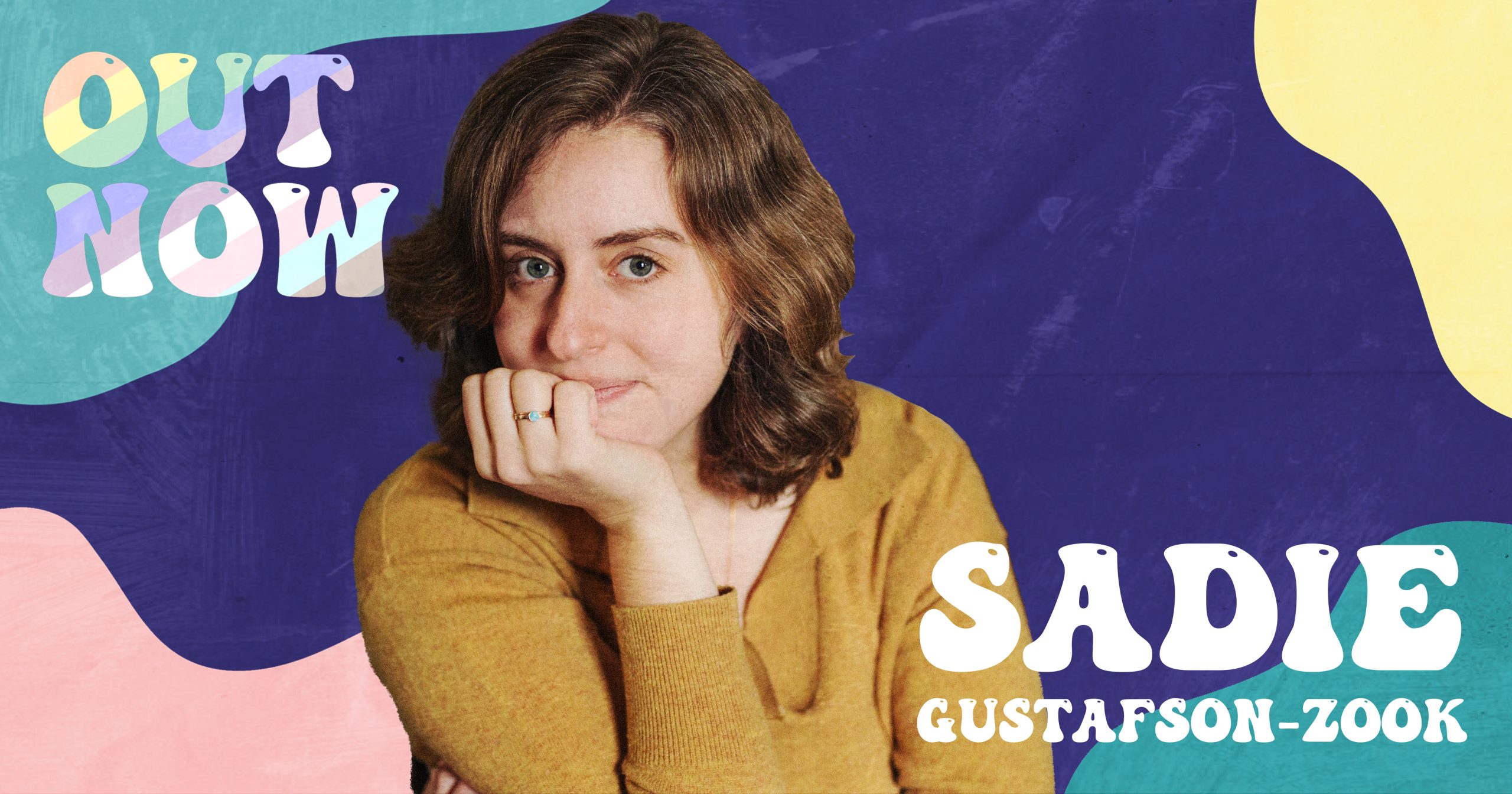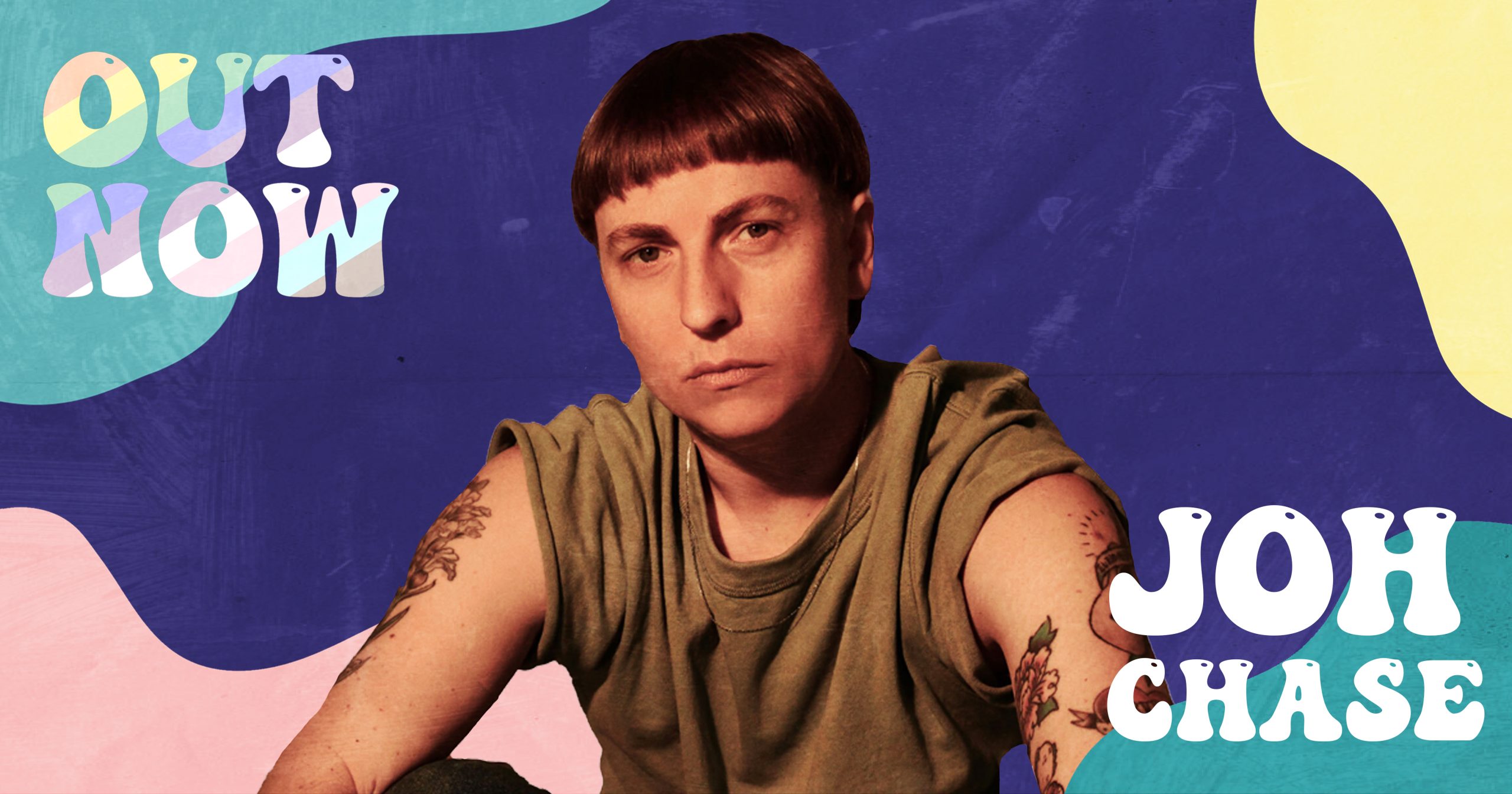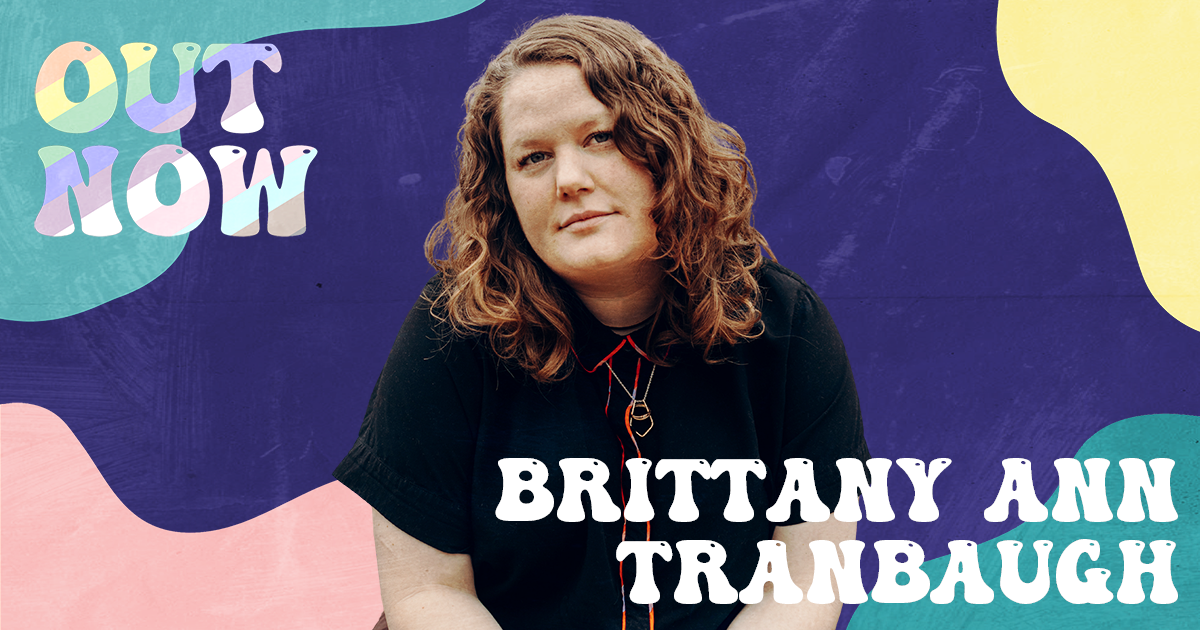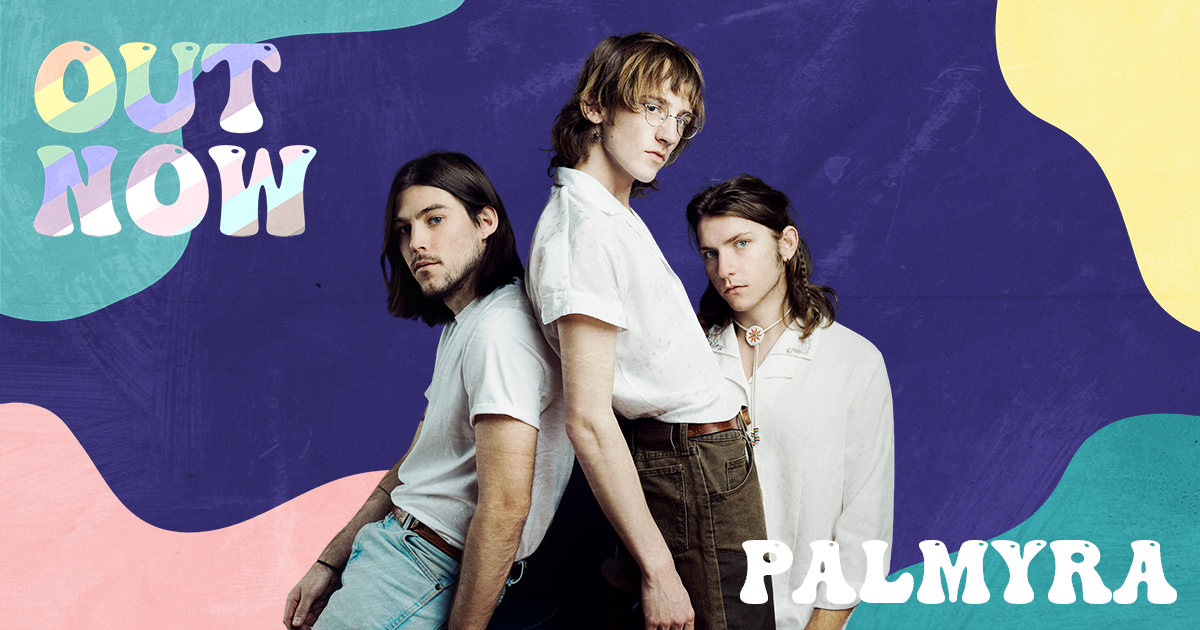Sadie Gustafson-Zook is a detailed songwriter, pulling together collages of images and ideas and stitching them into melodies and lyrics. I met Sadie in 2019 at Club Passim, a renowned folk venue in Cambridge, Massachusetts known for promoting generations of great folk music. I was studying in Boston at the time, surrounded by incredible developing artists. Sadie was one of them, alongside Liv Greene, Jobi Riccio (featured before on Out Now), and Olivia Barton, another queer artist who came through the Club Passim folk scene and is now gaining traction.
We are excited to share our interview with Sadie the same week she releases the incredible new album, Where I Wanna Be (available May 10). Their thoughtful writing, pure voice, and creative guitar lines are sure to impress. Many of the songs on the album have a lullaby-like feel enhanced by Sadie’s soft voice and soothing melodies.
This month, Sadie is touring the Midwest with Brittany Ann Tranbaugh, who we also featured on Out Now earlier this year. They are powerful songwriters and performers alone, but seeing both artists in one show is a treat that you don’t want to miss! If you’re in the area, be sure to catch their tour through Wisconsin, Minnesota, Michigan, and Indiana.
What’s your ideal vision for your future?
Sadie Gustafson-Zook: Ideally, I would be able to keep doing what I’m doing, but slightly more of it. I think my music offers something special and I would like for more people to hear it. At the same time, I really do like living at least part of the time as a normal person who is in their house and has a cat and is a part of their local community’s life – so maintaining a sense of balance is definitely something I’m passionate about.
Right now, my ideal vision would be to play 100+ fun gigs per year (I’m not really interested in gigging for the sake of the grind – I mostly want to have a good time and hang out with people I love); continue teaching privately and at music camps (I’ve been really lucky to be able to do this at Kerrville’s Song School, Kentucky Music Week, and this summer I’ll be at Ossipee Valley’s String Camp); spend a lot of time in nature and with my family; and keep absorbing so I have things to write about.
Why do you create music? What’s more satisfying to you, the process or the outcome?
I create music because I think it’s fun to sing and play instruments and I like writing about my own life in a way that other people can relate to. Personally, I like being able to organize my thoughts into a nugget that is shaped like a song and that helps me sort out my emotions. And then socially, I love having the opportunity to share those songs and feel a broader sense of connection with people around me – and people who I don’t know! So, I think the process and the outcome are both things I really enjoy.
Do you create music primarily for yourself or for others?
In college, I was a voice major and I spent four years singing operatic arias. I didn’t initially think this was what I was going to spend my college years doing, but once I started singing in such a big and full-body way, I had a really fun time experimenting with the extremes of what sounds my body was capable of producing. But when I performed these songs written by classical composers I didn’t feel very connected to the essence of the music. I sang it for myself, because it was fun (and probably also because I wanted people to pay attention to me), but I wasn’t assuming that my performance would touch something deep in someone else.
Since then, I have shifted towards writing and performing original music. I enjoy writing songs that are fun to sing and I write based on what I’m going through and what I need to talk about. Ironically, this feels like a more communal act than performing music that someone else wrote. I have the greatest chance of connecting with an audience over a shared experience if I’m speaking directly from my own experience, and ultimately my biggest goal is connection.
You shared about maintaining a sense of balance between being in the music industry and living in a home, with your pet, surrounded by community. Many artists and music-industry professionals have a challenging time with this. How have you built a sense of balance between these things? Do you have any words of advice for others working through the same challenges?
I’m very privileged to have an affordable living situation right now thanks to moving back to my hometown in the Midwest and having my parents as landlords. This freedom has made it possible for me to pay my bills exclusively with music-related work, which helps keep morale high in the music department. So I just want to preface everything else I say with the acknowledgement that it’s a lot easier to feel balanced when I’m not constantly worrying about money. While my situation is a privilege, I also know that not everyone would want to leave their music city hub and move in across the street from their parents in Indiana! Ha!
In terms of time balance, I’ve been testing out the way it feels to have music plans that take me away from home for one(ish) week each month, with some longer exceptions in the summer. That has been a nice way to not get too antsy at home, while also giving myself time to do more administrative work and be present in my town between tours. My first year of living in Goshen, I was pretty lonely and spent most of my time online, which honestly was horrible. I was really craving more in-person connections, so this year I’ve been digging into local activities as well as being really intentional about seeing my songwriter friends’ shows when they’re in a nearby city. Even when I don’t feel like leaving my house or driving a few hours away to see someone, I’m almost always happy that I did.
Your music is so descriptive, thoughtful, and well-crafted. What was the process like for you to write these 10 songs on the new album?
Thank you! The majority of these songs were written when I was living in Nashville in the spring of 2022 and then also when I was traveling around, sleeping in my car that summer. I had just had a breakup in Seattle and had to figure out where I wanted to live and between those two major changes I had a lot of processing to do! I also was spending a lot more time alone than I was used to and I felt like I had a lot of pent up creativity that came out really fast. Then there are also a few songs that I wrote once I was starting to feel a bit more settled in my hometown, as memories from my past kind of overlaid on top of my newer understanding of myself. Those came out more like steady drips throughout the end of 2022 and into 2023.
What inspired you to write Where I Wanna Be? What does the album mean to you and what do you hope others will take away from this collection of songs?
Although the album is called Where I Wanna Be, thematically the songs are more about who I wanna be and what I need to change in order to be that person. When someone asks, “How are you?” it’s easier to talk about geographical location (“I’ve been traveling a lot!”) as a substitute for emotional location (“I’ve been feeling really ungrounded”), especially when everything is in flux.
Each song, in its own way, speaks to who I want to be; I want to be someone who is free and expansive, who knows what makes me happy, whose identity reflects who I know myself to be, who is a part of a team/community, who doesn’t give my power away, who is consistently and historically queer, who trusts myself, who speaks up for myself and takes accountability, who feels at home in my geographical location, and someone who maintains a sense of curiosity in the midst of uncertainty. And that’s basically the whole album.
I think that’s why the album feels so intimate. Though I wrote this collection of songs for my own processing, I know that a lot of people go through this process for themselves, so I’m happy to lend my own experience to folks who might find it helpful.
The title track of the album, “Where I Wanna Be,” includes the lyric, “Every year I drive around, scope out the towns, thinking is this where I wanna be found.” I am curious if you feel a sense of the “grass is greener” in another town? I feel like this is a huge theme, especially among young adults, the idea that we may feel more fulfilled in another place.
Even if I daydream about moving, I find that I feel pretty aware of what I’m missing out on (in a positive and a negative way), and that helps with not over idealizing certain places. I know about the realities of living in Boston, or Brooklyn, or Nashville, or the PNW, and so all things considered, I’ve chosen to live where I am and visit those other places.
Sometimes I still daydream about living somewhere else, but mostly what I find myself imagining are the different communities I could be a part of. I’ve gotten little windows into different communities through meeting people at festivals and conferences, which are mysterious liminal spaces where people who live in different places gather together. They don’t represent an actual location where I could live permanently. And I think it’s helpful for me to remember that when I start feeling like I should move. Likely I’m imagining somewhere that doesn’t currently exist. Not that we couldn’t start an artist commune, though.
Who are your favorite LGBTQ+ artists and bands?
God, more like who isn’t LGBTQ+! [Laughs]
Spencer LaJoye, Flamy Grant, Jean Rohe, Liv Greene, Jobi Riccio, Singer & the Songwriter, Cloudbelly, Lindsay Foote, Olivia Barton, Joy Clark, Allison de Groot & Tatiana Hargraves, Olive Klug, Jane O’Neill, Brittany Ann Tranbaugh, Elisabeth Pixley-Fink, Adrienne Lenker, Taylor Ashton, Eliza Edens, Rachael Kilgour, Emily King, Judee Sill, and tons of obviously bisexual woman performers who aren’t publicly out.
For anyone reading this who might not be out of the closet, were there any specific people, musicians, or resources that helped you find yourself as a queer individual?
Although I’m bisexual, reading the Lesbian Masterdoc was very helpful as a way to sort through my past, draw connections between memories and feelings, and generally deconstruct the idea that being straight was the only option for me (compulsory heterosexuality). I also really loved reading Katie Heaney’s book, Would You Rather, and The Fixed Stars by Molly Wizenberg. (In addition to following every cute queer person I found on Instagram.)
What does it mean to you to be an LGBTQ+ musician?
I often feel like performers are treated kind of like inspirational court jesters, where we’re being the weird, thoughtful, creative ones, and the normal people come to shows to live vicariously through us. Honestly, it’s pretty similar to how queer people break boxes and live expansively just by being ourselves (except that queer stories are often suppressed and not amplified). So, if I have the opportunity to have a platform and the power to influence my audience, I want to take that responsibility seriously and show up as my fullest self so they can see that it’s possible for them as well. I love being a queer musician and knowing that by just being myself, I might be helping audience members learn more about themselves as well.
What’s the best advice you’ve ever gotten?
In 2016, I was attending the Rocky Mountain Song School and was a part of a partnered songwriting class where each participant told their partner a story from their life and then the partner would use that story as a songwriting prompt. My songwriting partner told me about his career trajectory and how someone advised him to get an entry-level job at the local venue that he wanted to play. So he got a job as a busboy at this venue and then progressively worked his way up, eventually becoming tight with the booker until he was selling out shows with his name on the marquee.
Although he wasn’t giving advice per se, I kept this story in mind when I moved to Boston after college and I got a job working at the box office of Club Passim. Regardless of career prospects, I think it’s a really good idea, for community building purposes, to become a regular wherever you want people to know you. For me, in working at Passim, I was hanging out there all the time and it was inevitable that I met a ton of super cool people who are doing really great things and now I feel pretty well-connected.
What are your release and touring plans for the next year?
This year is a big one for me! I’m (obviously) releasing this new album, Where I Wanna Be, and I actually have another recorded project scheduled for the fall! Tour-wise, I have been upping my booking game and will be touring around the Midwest in May with Brittany Ann Tranbaugh (we’ll likely be around Wisconsin and Minnesota when this article is published), the West coast in October with Jean Rohe, and the Northeast in November, and a lot of other spots in between! I’ll be teaching at a few songwriting and music camps as well, which I love to do. So I think it’ll be a great year!
Photo Credit: Morgan Hoogland



